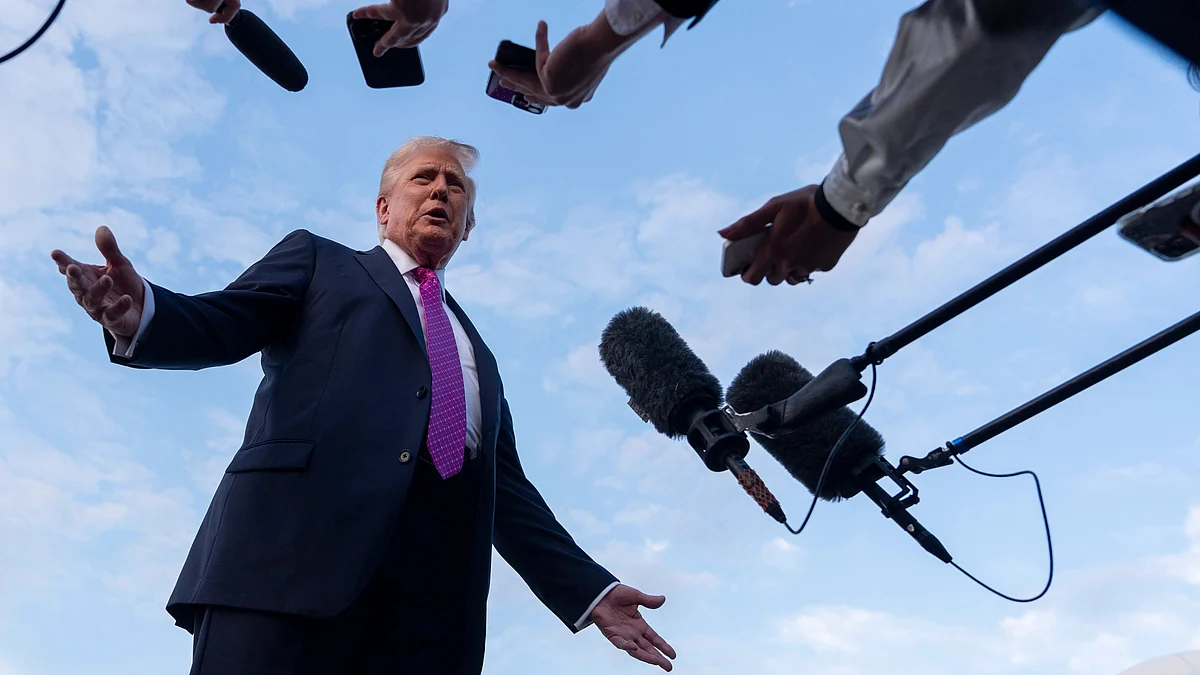Can Trump do it? Will a legal challenge strike down his $100K H1B visa fee?
The fee hike, introduced via executive order by the POTUS, raises the cost of a working visa hundredfold — a move that has sparked alarm across tech sector

Legal experts are predicting a tsunami of urgent lawsuits seeking to block the newly announced $100,000 H-1B visa fee from coming into effect. Central to the legal debate will be whether the US president has the authority under Section 212(f) of the Immigration and Nationality Act (INA), which permits the suspension of entry for non-citizens, to impose such a significant financial condition.
The fee hike, introduced via an executive order by President Trump on 20 September and slated to come into effect 21 September, raises the H1B visa cost from around $1,000 to $100,000, a hundredfold — a move that has sparked alarm across the technology sector.
Immigration specialists say Indian nationals, who represent the largest share of H1B visa holders, would be most severely affected.
“The President relies on INA 212(f), which allows suspending entry of noncitizens. In Trump v. Hawaii (2018), the Supreme Court upheld a broad travel ban. But that was an outright ban, not a financial condition,” said Abhinav Tripathi, immigration attorney and founder of Protego Law Group, while speaking to the Economic Times.
“Conditioning entry on a six-figure payment looks more like taxation, which only Congress can impose. Further, Congress has already set the H1B fee structure. A presidential proclamation cannot override that with a new payment scheme,” the lawyer added.
Tripathi explained that although the executive proclamation itself may not fall under the scope of the Administrative Procedure Act (APA), the government agencies responsible for its enforcement do.
“If the department of homeland security (DHS) or the department of state (DOS) begins enforcing the $100,000 payment condition immediately, without going through notice and comment rule-making, those enforcement actions are vulnerable under the APA — which calls for an appropriate procedure (such as public notice and inviting comments) to be followed prior to implementation,” he added.
Adding to Tripathi's reading of the situation, Cyrus D. Mehta, a noted immigration lawyer, believes the proclamation could indeed be challenged successfully, despite the Supreme Court’s earlier endorsement of a travel ban.
“The proclamation banning H-1B workers is so blatantly unlawful that it rewrites parts of the INA,” he said.
“It does not carve out exceptions for those who already have been issued H-1B visas or who were here in the US when the proclamation took effect. Prior bans clearly had exceptions for those who were present in the US on the effective date and then left," Mehta added.
“I also think H-1B visa holders with prior residence in the US going back over a decade (especially India-born H-1B holders caught in the green card backlogs) would have a strong due process claim if they were briefly outside the US and could not get back by the cut-off deadline under the new proclamation,’ he opined.
Immigration attorney Ashwin Sharma also criticised the measure, labelling it “executive taxation without Congress approval” and predicting swift legal action.
“Section 212(f) of INA allows suspending entry, but it does not authorise a $100,000 charge or rewriting USCIS and DOS fee schedules by executive proclamation alone. This fee is unlawful on its face and appears... calibrated to deliver a chilling effect on employers, and campuses,” Sharma stated.
‘Political posturing’
Meanwhile, Doug Rand, a former official at the department of homeland security, dismissed the move as political posturing.
“This isn’t real policy — it’s fan service for immigration restrictionists. Trump gets his headlines and inflicts a jolt of panic, and doesn’t care whether this survives first contact with the courts,” Rand said.
The American Immigration Lawyers Association (AILA) also condemned the executive order, calling it a dangerous overreach. Jeff Joseph, AILA’s president, warned that the policy risks shutting down access to essential skilled talent.
“America’s need for talented foreign professionals to fill critical workforce gaps, keep the economy moving forward, and create new jobs has not changed under the Trump administration. But overnight, this administration has turned the high-skilled H-1B programme into a ‘pay-to-play’ system and has effectively shut out teachers, non-profits, researchers, rural doctors, clergy, and other professionals who simply can’t afford Trump’s elitist revisioning of the H-1B programme,” Joseph said.
“Rather than working with Congress to strengthen and revitalise this critical high-skilled worker programme, the president has overstepped his executive authority on a proposal that will undermine innovation and prevent businesses both large and small from accessing the talent they need,” he added.
Whether or not the $100,000 visa fee survives judicial scrutiny or is halted by immediate court injunctions, legal experts agree on one point: the move has already created widespread uncertainty among employers, universities and skilled foreign professionals — many of whom are now re-evaluating their plans to work in or return to the United States.
Meanwhile, the Indian nation — those who are still eager to study and work in the United States — are hoping Prime Minister Narendra Modi’s evening address brings some comfort.
Follow us on: Facebook, Twitter, Google News, Instagram
Join our official telegram channel (@nationalherald) and stay updated with the latest headlines
